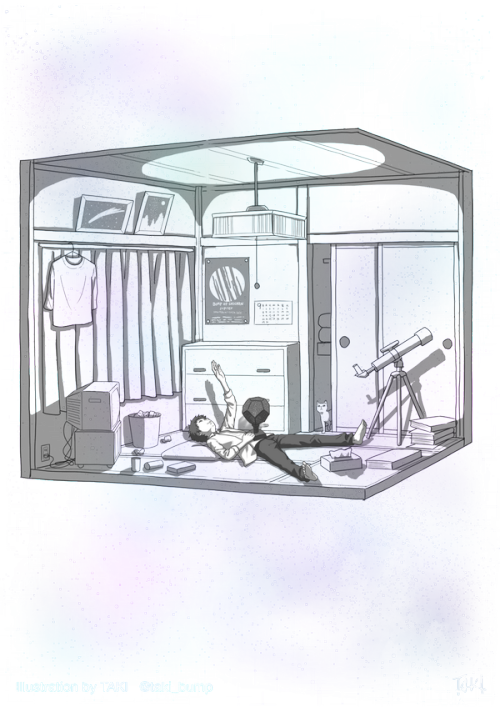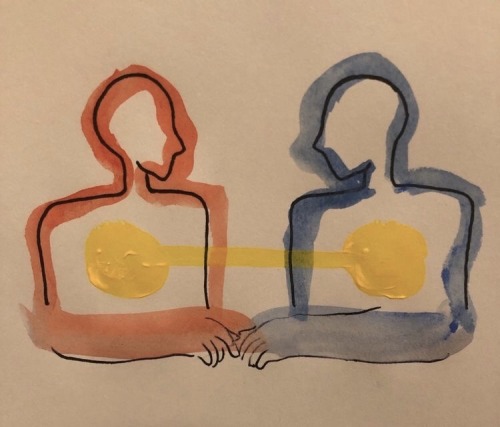Finalities
Finalities
My hands have grown tired of writing about you Though the scars long since have faded into skin Smooth, edge-less, no longer promising red, A mother's daughter through out and through in.
Sleep is less tiresome, and all my work once done Leaves me fiddling with spare hours at the table, Twisting them in and out of a ring that shines on My fourth finger - chipped from the old fable Where the kindest doves would nip down at the Lover who wore your shoes, and drive her out Barefoot into the night - where you only yesterday Curled up under, melting tears into silent clout.
But there, it is a fable other hands have written, An embrace where other shoulders found shelter, And many others yet found tranquilled lethe. Mine is not a story foretold, perhaps for the better.
It has been very long.
Perhaps the lack of a proper Farewell kept me from exiting the scene definitely, so here I am, properly clad in mourning white, clutching at a handkerchief and a bouquet of marigolds. Marigolds in our country are worn in the hair and as necklaces by the bride. Who am I being given away to? From where I stand, it looks like a pyre, where one is burnt with her dead lover. I began to write for you, dearest, and so I shall stop for you, for you are gone. Other fingers now are exploring the crook in your smile, the scar on your hip. Other hands hold yours as you gaze into the deathly moon on quiet summer nights. Other songs nest in your head, ones you and her share.
And here, here I am. Pinning myself to every chord you ever sang to me, but never will once again.
I shall not love again.
More Posts from Lacexleaves and Others
For those of you who asked, here’s a list of some of my favourite poems:
Soleil et Chair (Sun and Flesh), Arthur Rimbaud Litany, Rebecca Linderberg A Myth of Devotion, Louise Glück L’Après-Midi d’un Faune (The Afternoon of The Faun), Stéphane Mallarmé Fever 103°, Sylvia Plath It’s No Use, Sappho (tr. Barnard) Orpheus. Eurydice. Hermes, Rainer Maria Rilke The Glass Essay, Anne Carson Alchimie du Verbe (Alchemy of the Word), Arthur Rimbaud I Will Wade Out, E. E. Cummings Mrs. Beast, Carol Ann Duffy Elsa au Miroir (Elsa at The Mirror), Louis Aragon To Fanny, John Keats The First Elegy, Rainer Maria Rilke Persephone The Wanderer (I), Louise Glück Mad Girl Love Song, Sylvia Plath He Seems to Me, Sappho (tr. Carson) F. de Samara to A. G. A., Emily Brontë Pietà, Rainer Maria Rilke (and its many translations) To Proserpine (Orphic Hymn), Anonymous The Unicorn, Angela Carter Saying Your Names, Richard Siken Apparition, Stéphane Mallarmé The Tiger, Pablo Neruda Lady Lazarus, Sylvia Plath Clair de Lune, Roland Leighton I Like My Body When, E. E. Cummings When We With Sappho, Kenneth Rexroth Look On This Picture and On This, Christina Rossetti Nacciyar Tirumoli, Andal (tr. Sarukkai Chabria) Zuleikha, Rumi Marathon, Louise Glück The Red Poppy, Louise Glück The Concert of Hyacinths, Odysseus Elytis (tr. by Kimon Friar) Song for an Ancient City, Amal El-Mohtar Prayers in a Temple, Yusuf al-Khal (tr. by Abdullah al-Udhari) The Convent Threshold, Christina Rossetti Letter to Husband, Emily Berry my love, E. E. Cummings Glanmore Sonnet X, Seamus Heaney Plead for Me, Emily Brontë


Memorial
Sometimes is enough for one wish.
And a walk from the corner
And back under the trees and light
Is often enough for a thought to perish
And a million others to be born
From their graves
The way shells explode
Under the hills of tin men and grass
Long after the blood-bath is but an anecdote
A story for a hot summer's evening on the porch
Or a tale told on idle winters
Through the dislodged teeth of the old ones.
- pollosky-in-blue
The mild breeze twisted over the cloud of sunset,
Poised as though the sea had taken up
the form of her capricious admirer,
To stretch out her arms and reach for her
untouchable muse.
The pearly light of the moon twinkles
with the light of heavenly solace
Upon the ceaseless wave wandering in confounding
aimlessness,
All while the depths of the untouched ocean
rumble with the disturbed murmurs whispered to an
empty heart, wherein the first star at twilight
and the final star at dawn, will be united in a
yearning embrace, someday.










smokeinsilence / sightofsea / young love by bts / nizar qabbani / abeba birhane / the waves by virginia woolf / franz kafka letters to milena / ratsandlilies.art / the butterflys burden by mahmoud darwish / underneath the stars by mariah carey
To love another as myself is the highest love possible because it signifies an erasure of division, no other, no rigid self either. The light of life is united through recognition and similarity

INTJ vs INTP cognitive mechanics - an analysis based on an observation
With study of the cognitive functions I'm finally starting to recognize what INTJness actually feels like.
The other day, I was going through a programming tutorial as part of a larger book on the functional programming style. I was modifying the example slightly to produce a different output, and suffice it to say it wasn't working. I called on my INTP, who is doing the same tutorial, to see if they could figure it out.
Basically, my approach was trying to "tap into" my Ni, looking over the script from a zoomed-out perspective and getting a feel for where the problem might be. I get the general feeling that the second half of a certain function isn't working. I test this assumption, I was right - so now I try to narrow down in my mind where it "seems off", and come to a vague conclusion that it's probably the order of execution. I test this assumption. It works. The example is now working as expected. I don't have a clear, 100% understanding of why exactly the order of the statements was causing the particular bug, but I move on, because I realize that this kind of error is more of a general silly-mistake in how I wrote the algorithm, and isn't something instrumental to the greater goal - which is understanding the mechanics of the functional style.
My INTP friend, in contrast, looks at the script not from a zoomed-out perspective, but goes through the logic, one step at a time, analyzing exactly what each statement does and the effects it has - and how the result should look at each point in time, and why, until they figure out exactly what was wrong and why. They didn't just get a vague intuitive understanding of how to fix it and move on, they understood in detail how every single component interplays with every other, why the statement execution must be in this order for the algorithm to work, and all the other ways changing the order of the statements would affect the output. They have understood all the mechanics of the algorithm through pure logic, and it took them much longer to move on than it did for me - but unlike me, who was doing the problem for its general purpose within the goal of understanding functional programming, they felt that understanding the algorithm (which on its own is not related to functional programming at all, and is just a modified sort algorithm), was something they wanted to understand all the components of, regardless of whether it is meaningful to the purpose of the assignment.
This felt like a very illustrative moment in understanding the differences between how INTP and INTJ approach problem-solving. Of course, as INTJ I am also compelled to learn the mechanics of all sorts of things, even those irrelevant to the overarching goal of whatever the book or the tutorial or class or the thing I am studying is right now - but I would tend to note them and set them aside for later to learn, as something separate from the process. I went back over the sort algorithm with a more Ti approach myself later, after I had grasped the concepts in the chapter I was working on, and was ready to take a break. The first "goal" was gaining an understanding of the concepts in that chapter of the tutorial, and I did not allow myself to be distracted from this purpose - but when it was done I went back to the algorithm I got wrong and Ti-ed my way through the logic, step by step. But this happened in a separate process from doing the tutorial, and a separate timeline - I didn't allow the "working on this chapter" timeline to fork into the subprocess of working out this unrelated algorithm error for any longer than it absolutely needed to.
For my INTP friend, however, following this unrelated tangent - right then and there, in the middle of the process of understanding the chapter and in the same timeline - was something perfectly natural. It was natural for them to make many "deep forks" in the path to understanding the chapter, almost so much so that they may not even make it through to the end of the chapter, and instead get lost in the study of the forks and tangents along the way. As an INTJ I just could not do this - I would feel very mentally unsettled about this.
I feel the INTP approach with Ti/Ne is very thorough but incremental and undirected in its understanding; the Ni/Te approach of the INTJ is a lot less thorough, and more "overarching" - focused more on setting up the "skeleton" or the inner structure of the framework first, and then filling it out with details - and being always painfully conscious of the shape of the path one is following. Almost as if there is always this voice nagging you that this item may be irrelevant right now, come back to it later. It is like an architect trying to capture the overallness, or a writer trying to synthesize the outline of the entire story out of thin air first, and then refining all the generalities and fleshing them out. The coherent whole comes first, and is always there and always something one is deeply conscious of, and driven by. It is like the INTJ is going through every process with a general (usually not very detailed) map or compass that they follow, always internally tugging them back to North, whereas INTP is wandering through all the nooks and crannies of the landscape without a map or a compass, and seeing what kind of fascinating mental discoveries they have on the way. They may have a purpose in mind, but it can be diverted away from indefinitely and come back to later, if there are more interesting paths to explore on the way - whereas for the INTJ the interesting paths will be noted and come back to later, as it would feel "wrong" in a fundamental way to divert away from the purpose.
I still have a difficult time figuring out how Ni worked the way it did - I suppose part of it is that I already have a decent amount of programming experience, and was able to subconsciously extract a deep pattern from what I had experienced before, without knowing where exactly I had seen this before or what it was based on. My intuition was like a synthesis of patterns I had extracted before - like a deep-learning algorithm "figuring things out" from intermediate representations. This may be why it required a lot of Se input and Ti-type analysis in the very start of my programming study before I could begin to "grasp" it, as it served to "feed" my Ni with raw materials and structures to synthesize patterns and meta-patterns from, and later synthesize hunches like this. So now I can often "feel" the way to solve something, without explicitly working through the logic.
Naturally everyone who gains proficiency or experience in some field finds themselves doing this - as humans we are equipped with all the cognitive functions, after all - but as an INTJ it is my first instinct to do this to everything, and is my most visceral response to a problem - and the impulse to analyze with Ti usually comes later, as a conscious decision. As far as I understand it, for my INTP friend it was the opposite - the first response to a new concept or a problem is to analyze it and all its components and understand every small piece of the mechanics - even if they get an Ni "hunch" about what is wrong, they tend to not trust it as much, and the impulse to analyze is first and foremost.
Just some rambling observations on Ti and Ni mechanics.
When Mahmoud Darwish said, "A University degree, four books and hundereds of articles and I still make mistakes when reading. You wrote me 'good morning' and I read it as 'I love you'."
-
 el-secreto-emporium reblogged this · 2 years ago
el-secreto-emporium reblogged this · 2 years ago -
 blrowanduck liked this · 3 years ago
blrowanduck liked this · 3 years ago -
 lacexleaves reblogged this · 3 years ago
lacexleaves reblogged this · 3 years ago -
 lacexleaves liked this · 3 years ago
lacexleaves liked this · 3 years ago -
 anjo-by-the-sea reblogged this · 3 years ago
anjo-by-the-sea reblogged this · 3 years ago -
 pollosky-in-blue reblogged this · 3 years ago
pollosky-in-blue reblogged this · 3 years ago -
 fetch-theboltcutters liked this · 3 years ago
fetch-theboltcutters liked this · 3 years ago -
 trinns liked this · 3 years ago
trinns liked this · 3 years ago -
 messyobservationist reblogged this · 3 years ago
messyobservationist reblogged this · 3 years ago -
 messyobservationist liked this · 3 years ago
messyobservationist liked this · 3 years ago -
 anjo-by-the-sea reblogged this · 3 years ago
anjo-by-the-sea reblogged this · 3 years ago -
 anjo-by-the-sea liked this · 3 years ago
anjo-by-the-sea liked this · 3 years ago -
 pollosky-in-blue liked this · 3 years ago
pollosky-in-blue liked this · 3 years ago -
 its-toasted liked this · 3 years ago
its-toasted liked this · 3 years ago -
 squishysack liked this · 3 years ago
squishysack liked this · 3 years ago -
 beardedartanimesports liked this · 3 years ago
beardedartanimesports liked this · 3 years ago -
 pollosky-in-blue reblogged this · 3 years ago
pollosky-in-blue reblogged this · 3 years ago

A fond insect hovering around your shoulder. I like Kafka, in case you're wondering.
160 posts
